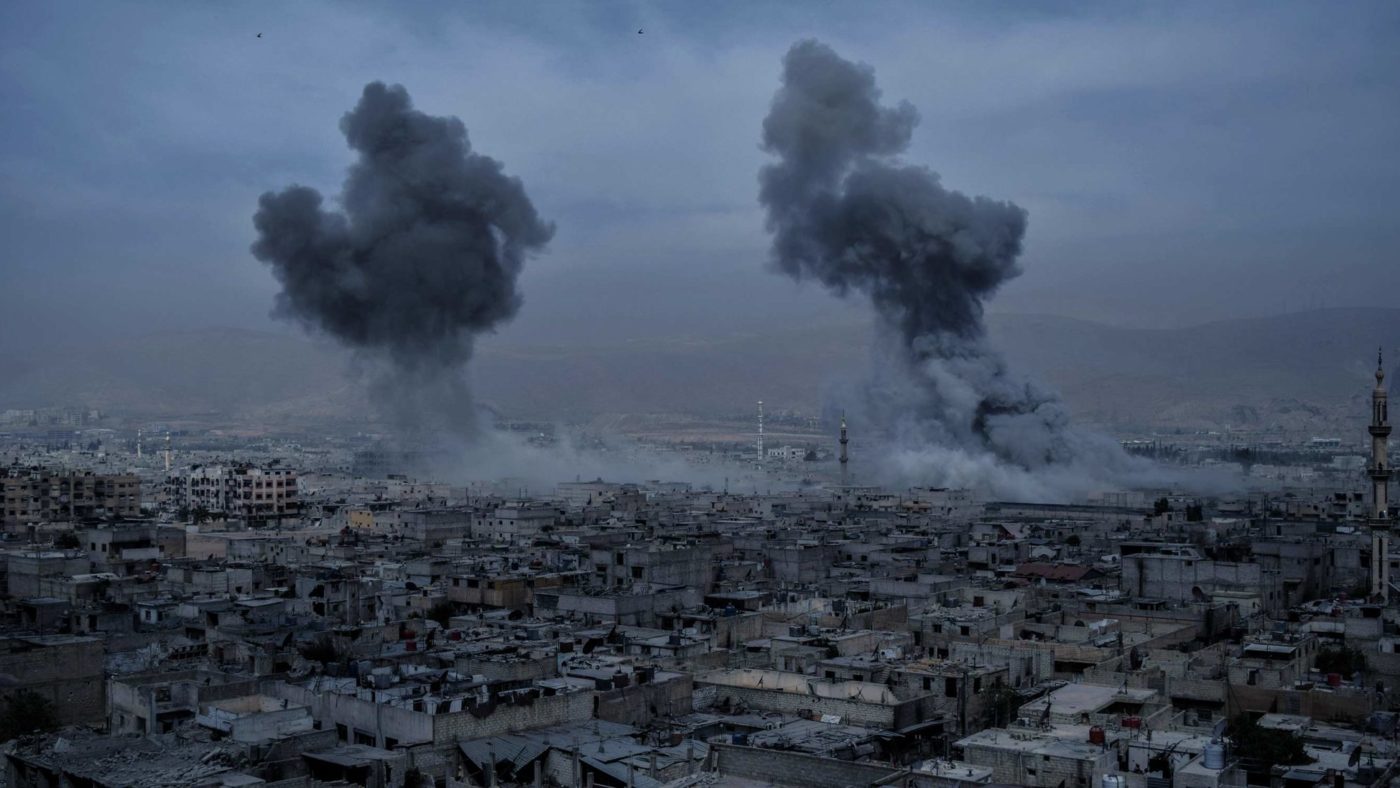Marie Colvin, the Sunday Times war correspondent, was killed in 2012 in a rocket attack on a media centre in the rebel-held city of Homs in Syria. A legal case being brought by Colvin’s family is now being heard in Washington. It alleges, on the basis of testimony from highly placed defectors, that the Assad regime deliberately tracked and targeted foreign journalists reporting on the conflict.
The case was filed last month. It will seem extraordinary but a tiny group of British academics, with their ideological confreres, chose last weekend of all times to hold an event in Leeds promoting pro-Assad conspiracy theories under the heading “Media on Trial”. Reflect on that. They sought to metaphorically put on trial not the Assad regime, the perpetrators of war crimes including chemical attacks and the use of barrel bombs on civilian areas, but my profession of journalism.
These academics are the same people whose propaganda activities The Times reported on last month. They lack specialist knowledge of chemical warfare, Middle East politics or US foreign policy and they generally express themselves through polemics rather than work conforming to scholarly standards.
Though the personalities themselves are few in number and have scant intellectual weight, the propaganda needs to be countered. It’s merely the latest example of a tendency that seeks to obfuscate state crimes and flatter the regimes that perpetrate them. In some cases, they are literally the same people doing it, merely flitting from one disreputable cause to another.
One such case is an American campaigner, who styles himself an “investigative journalist”, called Gareth Porter. He is among the most prominent voices in radical media disputing that Assad has used chemical weapons against civilians. In 1976 he co-authored with George C. Hildebrand a book titled Cambodia: Starvation and Revolution, which – astonishing as it may seem – set out to whitewash the genocidal regime of Pol Pot that had taken power the previous year.
As Samantha Power recounts in her book ‘A Problem from Hell’: American and the Age of Genocide: “Without ever having visited the country, [Porter and Hildebrand] rejected atrocity reports. The city evacuations, they argued, would improve the welfare of Cambodians, whose livelihoods had been devastated by the Nixon years. They were convinced that American and European media, governments and anti-Communists were colluding to exaggerate [Khmer Rouge] sins for Cold War propaganda purposes.”
Sound familiar? Take away the references to Communism and the Cold War and you have the comparable case made by pro-Assad and pro-Putin campaigners today. These arguments have nothing to do with the plight of real people in the countries suffering oppression and war. They are all about the iniquities (not all of them imaginary) of the United States and its allies.
Another campaigner who whitewashed Assad’s atrocities is the late Edward Herman, a co-author books on foreign policy and the media with the linguist Noam Chomsky. I wrote about Herman for CapX after his death last year and pointed out his egregious lies denying the Srebrenica massacre of 1995. His defence of the campaign by Slobodan Milosevic to create a “Greater Serbia” led him inexorably to deny real acts of genocide. Herman spoke no Balkan languages and (I believe) never visited Bosnia. It was enough for him that the US disapproved of Milosevic, whose side he took and glamorised. I’ve no doubt that this charlatan was a conscious fraudster.
Why do people do this? The sins of omission and commission, and sometimes crimes, of Western foreign policy are plainly not a sufficient reason even to explain, let alone extenuate, a denial of grotesque war crimes by repressive regimes. Part of it may be the existence of (in a term coined by the literary critic Lionel Trilling in 1965) an adversary culture. This consists in a willingness to believe the very worst of the imperfect societies of the liberal West and overlook atrocities committed by anti-Western regimes or movements.
The apotheosis of this perverse instinct is to blame the victims for the crimes committed against them. Professor Piers Robinson of Sheffield University, who spoke at the Media on Trial event, provided a blurb for a recent book by David Ray Griffin, the most prominent of the 9/11 Truth campaigners in the US, who maintains that the attack on the World Trade Center was a “false flag” event. According to Robinson: “From 9/11 and the ensuing regime change wars, through to the terrifying dangers now posed by climate change, this work is an essential wake-up call for the people of the West. Everyone should read this, and then act upon what they have learned.”
Part of the reason may also be the power of flattery to turn people’s heads. The pro-Assad academics’ sources are neither scholars in the relevant fields nor genuine reporters who are trained to distinguish fact from propaganda, but obscure bloggers whose only qualification is obsequiousness to the regime in Damascus. But above all, I suspect, is the power of irrationalism. It’s very potent when ideological certitudes are at stake.
Walter Krivitsky, a Soviet spy who defected to the West in the 1930s, noted in his memoir In Stalin’s Secret Service: “Some of those who confessed [in the Moscow Trials of the 1930s] to the plotting of Kirov’s death had been in solitary confinement for several years before his assassination.” Those confessions were made through fear and mental and physical torture, but – as brilliantly fictionalised by Arthur Koestler in his novel Darkness at Noon – there was surely also an ideological devotion that caused its adherents to abandon critical faculties.
In modern conflicts, within national borders as well as crossing them, you can discern a stubborn and immovable dogma about Western culpability regardless of any facts or evidence. It’s like this every time. The institutions of a society founded on critical inquiry need to be aware of it and expose it, whenever it appears.


